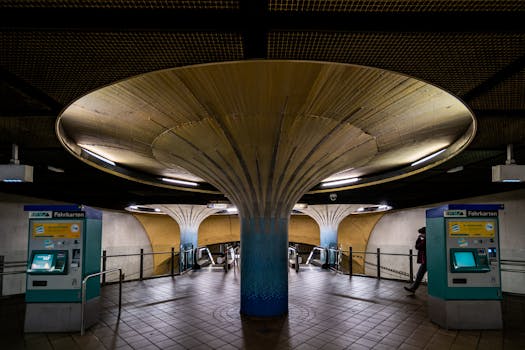
Rapido's Unified Ticket Revolution: Seamless Metro Travel on the Horizon?
The daily commute for millions of city dwellers is often a chaotic mix of different transport modes. Navigating the complexities of metro systems, buses, and ride-hailing services can be a frustrating and time-consuming ordeal. However, a potential game-changer is emerging: Rapido, the popular bike taxi and auto-rickshaw aggregator, is reportedly planning a unified ticket system for metro travelers, promising to streamline urban mobility and significantly improve the commuting experience. This initiative has the potential to revolutionize last-mile connectivity, a persistent pain point for many public transportation users.
What is a Unified Ticket System?
A unified ticket system, in this context, refers to a single ticket that allows passengers to seamlessly transition between different modes of transportation, specifically the metro and Rapido's bike taxi or auto-rickshaw services. Instead of juggling multiple tickets or apps, users would purchase a single ticket covering their entire journey, making the process far simpler and more convenient. This could significantly reduce the hassle of purchasing separate tickets for each leg of their journey and potentially save them money. The implementation would leverage integrated ticketing systems and likely involve mobile ticketing solutions for ease of use. This approach mirrors successful models implemented in other global cities, demonstrating its potential for widespread adoption.
Addressing the Last-Mile Connectivity Challenge
One of the biggest challenges faced by metro systems worldwide is last-mile connectivity. While metros efficiently transport passengers across long distances, reaching the final destination often involves a complex and often inconvenient journey, using buses, autos, or walking. Rapido's proposed unified ticket aims to tackle this problem directly. By integrating its services with metro networks, Rapido can offer a smooth and convenient solution for the crucial last mile, significantly improving the overall user experience and boosting the appeal of metro transport.
Potential Benefits for Commuters:
The benefits of a Rapido unified ticket system are numerous:
- Simplified Journey Planning: No more juggling multiple tickets or apps. A single ticket covers the entire journey, simplifying planning and reducing confusion.
- Cost Savings: Potentially lower overall travel costs compared to purchasing separate tickets for different modes of transportation.
- Reduced Travel Time: Seamless transitions between metro and Rapido services will save valuable time, reducing commute durations.
- Improved User Experience: A more comfortable and hassle-free commuting experience, increasing the appeal of public transport.
- Enhanced Accessibility: Improved accessibility for commuters, particularly those with mobility challenges who might find multiple transfers difficult.
- Increased Metro Ridership: By improving convenience, the unified ticket system could attract more riders to the metro, boosting ridership numbers.
Challenges and Considerations:
Despite its potential benefits, the implementation of such a system faces several challenges:
- Integration with Metro Operators: Successful implementation requires seamless integration with existing metro ticketing systems, which might involve significant technical and logistical hurdles. This will involve negotiations and agreements with multiple metro operators across different cities.
- Pricing Strategy: Developing a fair and competitive pricing structure is crucial for the success of the unified ticket. The pricing must be attractive to commuters while ensuring profitability for Rapido and the metro operators.
- Technological Infrastructure: A robust and reliable technological infrastructure is essential to support the unified ticketing system. This includes developing a user-friendly mobile application and ensuring seamless data exchange between different systems.
- Regulatory Approvals: Obtaining necessary regulatory approvals from various government agencies can be a lengthy and complex process. Navigating these regulatory requirements is crucial for the project's successful launch.
Potential Impact on the Transportation Landscape:
If successful, Rapido's unified ticket system could significantly reshape the urban transportation landscape. It could encourage greater use of public transportation, reduce traffic congestion, and improve overall urban mobility. This initiative has the potential to serve as a model for other cities looking to improve their public transportation systems and address the perennial issue of last-mile connectivity. The success will heavily depend on the execution and its ability to address the challenges mentioned earlier. This is especially true for seamless multimodal transportation options.
The Future of Urban Mobility:
Rapido's ambition underscores a broader trend towards integrated and intelligent transportation systems. Cities are increasingly recognizing the need for seamless integration between different modes of transport to create efficient, convenient, and sustainable urban mobility solutions. This initiative could be a significant step towards a future where commuting is less stressful and more efficient, reflecting a global shift towards smarter, integrated transport networks. The future of commuting could well depend on initiatives like this one.
Conclusion:
Rapido's proposed unified ticket system holds immense potential to revolutionize urban commuting. While challenges remain, the potential benefits for commuters and the broader transportation system are substantial. Its success hinges on effective collaboration with metro operators, robust technological infrastructure, and a well-defined pricing strategy. If successful, it could set a precedent for other cities striving to enhance the efficiency and convenience of their public transportation networks, demonstrating a significant leap forward in the evolution of smart city initiatives. The rollout and eventual success will be closely watched by transportation planners and commuters alike.




















